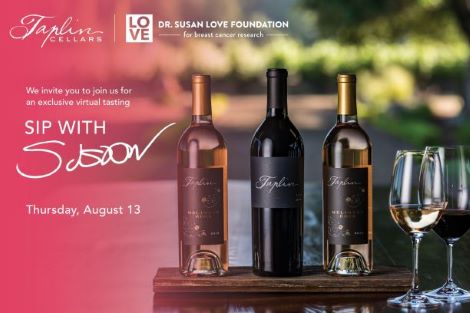When Melinda Taplin was diagnosed with breast cancer over 10 years ago, her brother, a physician, connected her with Dr. Susan Love. It was often difficult to even articulate the questions Melinda wanted to ask her doctor, but Dr. Susan Love’s Breast Book provided guidance and understanding so Melinda could formulate her questions. Despite the knowledge that exists there are still many unanswered questions that can help prevent and cure breast cancer. The Foundation is undertaking much of that research.
The need to address unanswered questions is the motivation behind our Melinda’s Rosé partnership with Dr. Susan Love Foundation for Breast Cancer Research.
There is an opportunity to participate in a conversation with Dr. Susan Love when Dr. Stephen Taplin hosts her virtually at Taplin Cellars on
Thursday, August 13th at 4:30pm Pacific Time
Register for the full Taplin Cellars tasting package for $375 with a donation to the Foundation included
The package includes two bottles of Melinda’s Rosé and a bottle of the 2016 vintage of the Cabernet Sauvignon from the Taplins’ 155-year-old renowned estate. This wine has not yet been released to the public, so participants are in for a treat!
Register with wine package and donation here.
Thursday, August 6th is the last day to order your tasting package to receive it in time for the event.
You can also register for the event, without the wine tasting package, for $50 here.
Why Dr. Susan Love Foundation for Breast Cancer Research? Because of their approach based on evidence, because of their innovative thinking, and because they are looking for answers that are relevant to women. Just to give an example, you would think that in the 21st century human anatomy is well understood. Surprisingly, the breast and its ducts are understudied. Breast cancer likely originates in the breast ducts, so understanding the ductal system is crucial to finding the cause of breast cancer. Dr. Susan Love Foundation for Breast Cancer research is using ultrasound technology to map the usual anatomy of the ductal breast system. In science, it is often these overlooked areas that can provide the knowledge we need to fully prevent disease.
Back to Recent Updates
